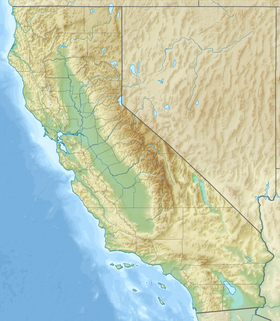Las Garzas Creek is a 9.0-mile-long (14.5 km)[4] northeastward-flowing stream, the lowermost major tributary of the Carmel River. It originates about 1.2 miles (1.9 km) southeast of Palo Corona summit[5] on a saddle between Patriarch Ridge[6] and an unnamed peak to its south. This saddle is part of the east-west watershed divide of the northern Santa Lucia Range.[7] The creek flows almost entirely through the Santa Lucia Preserve to its confluence with the Carmel River in Carmel Valley, Monterey County, California.[2]
| Las Garzas Creek | |
|---|---|
 Carmel River Watershed Map with major tributaries, National Marine Fisheries Service 2013 | |
| Location | |
| Country | United States |
| State | California |
| Region | Monterey County |
| Municipality | Carmel Valley, California |
| Physical characteristics | |
| Source | Southern flank of Patriarch Ridge, on the northeastern slope of the Santa Lucia Range |
| • coordinates | 36°26′20″N 121°51′17″W / 36.43889°N 121.85472°W[3] |
| • elevation | 2,814 ft (858 m) |
| Mouth | Confluence with the Carmel River |
• location | Carmel Valley, California |
• coordinates | 36°29′32″N 121°45′04″W / 36.49222°N 121.75111°W[3] |
• elevation | 217 ft (66 m)[3] |
| Basin features | |
| Tributaries | |
| • right | Salsipuedes Creek, Cienega Creek |
History
editLas Garzas Creek was historically Arroyo de Las Garzas, Spanish for "place of the herons".[1][2] It reaches the Carmel River at the historic Rancho Potrero de San Carlos given in 1837 by Governor Juan B. Alvarado to Fructuoso del Real, a Native American from the Mission San Carlos.[8] In 1851 it was acquired by Bradley Varnum Sargent and his brothers. In 1920, New Yorker George Gordon Moore acquired it, and renamed it the 20,000 acre San Carlos Ranch. Arthur C. Oppenheimer bought it in foreclosure in the early 1930s and made it into a cattle ranch, then in 1990 it was acquired by the Pacific Union Company which changed the name back to "Rancho San Carlos".[2]
Watershed
editThe Las Garzas Creek watershed drains 13.2 square miles (34 km2).[9] Its source is at 2,814 feet (858 m) elevation east of the watershed divide just south of Patriarch Ridge on the eastern edge of Joshua Creek Canyon Ecological Reserve in the northern Santa Lucia Range. The creek flows east into and through the Santa Lucia Preserve. After receiving the waters of Salsipuedes Creek[10] it reaches San Francisquito Flat,[11] a large marshy area which includes an impounded 17-acre reservoir known as Moore's Lake (constructed in the 1920's and named for former owner George Gordon Moore).[12][2] Here it receives flows from Cienega Creek. Next, the creek passes beneath Robinson Canyon Road and proceeds northeast through a canyon, reaching the Carmel River in Carmel Valley, California. Las Garzas Creek is one of three Carmel River subwatersheds (Pine, Garzas, and Black Rock/San Clemente creeks) which produce 27% of the annual Carmel flow, although they compose only 15% of the Carmel watershed area.[9]
Ecology
editSteelhead trout (Onchorhynchus mykiss) spawn and rear in Las Garzas Creek, although California Department of Fish and Wildlife staff indicated that "The major factors limiting steelhead production are inadequate sized gravels for spawning and low stream flows… The low stream flows during the summer could be supplemented with flow releases from Moore Lake, especially later in the summer when Las Garzas Creek becomes intermittent" and access as far upstream as Robinson Canyon Road is blocked by boulder cascades.[13][14]
See also
editReferences
edit- ^ a b Erwin G. Gudde; William Bright (2010). California Place Names–The Origin and Etymology of Current Geographical Names. Berkeley, California: University of California Press. p. 141. ISBN 978-0-520-26619-3.
- ^ a b c d e Donald Thomas Clark (1991). Monterey County Place Names: A Geographical Dictionary. Irvine, Scotland: Kestrel Press. ISBN 978-1-880478-00-4.
- ^ a b c "Las Garzas Creek". Geographic Names Information System. United States Geological Survey, United States Department of the Interior.
- ^ U.S. Geological Survey. National Hydrography Dataset high-resolution flowline data. The National Map Archived March 29, 2012, at the Wayback Machine, accessed March 15, 2011
- ^ U.S. Geological Survey Geographic Names Information System: Palo Corona
- ^ "Patriarch Ridge". Big Sur Land Trust. Retrieved September 30, 2022.
- ^ "Santa Lucia Range". Geographic Names Information System. United States Geological Survey, United States Department of the Interior.
- ^ Ogden Hoffman, 1862, Reports of Land Cases Determined in the United States District Court for the Northern District of California, Numa Hubert, San Francisco
- ^ a b Rami Shihadeh; Thomas Christensen; Carmel River Task Force members. The Carmel River Watershed Assessment and Action Plan 2016 (PDF) (Report). Monterey County, California: Resource Conservation District of Monterey County, Monterey Peninsula Water Management District, and Carmel River Watershed Conservancy. Retrieved October 1, 2022..
- ^ "Salsipuedes Creek". Geographic Names Information System. United States Geological Survey, United States Department of the Interior.
- ^ "San Francisquito Flat". Geographic Names Information System. United States Geological Survey, United States Department of the Interior.
- ^ Scott Brown; Stacey Porter; Mark Woyshner; Barry Hecht (May 1, 2003). Hydrologic record for water-year 2002: Las Garzas, Potrero, and San Clemente Creeks, Santa Lucia Preserve, Monterey County, California (Report). Balance Hydrologics, Inc.
- ^ Gordon S. Becker; Isabelle J. Reining (2008). Steelhead/Rainbow Trout (Oncorhynchus mykiss) Resources South of the Golden Gate, California– Steelhead/rainbow trout resources of Monterey County (PDF) (Report). Oakland, California: Center for Ecosystem Management and Restoration. Retrieved September 30, 2022.
- ^ Gordon S. Becker; Katherine M. Smetak; David A. Asbury (2010). Southern Steelhead Resources Evaluation– Identifying Promising Locations for Steelhead Restoration in Watersheds South of the Golden Gate (PDF) (Report). Oakland, California: Center for Ecosystem Management and Restoration. Retrieved September 30, 2022.
